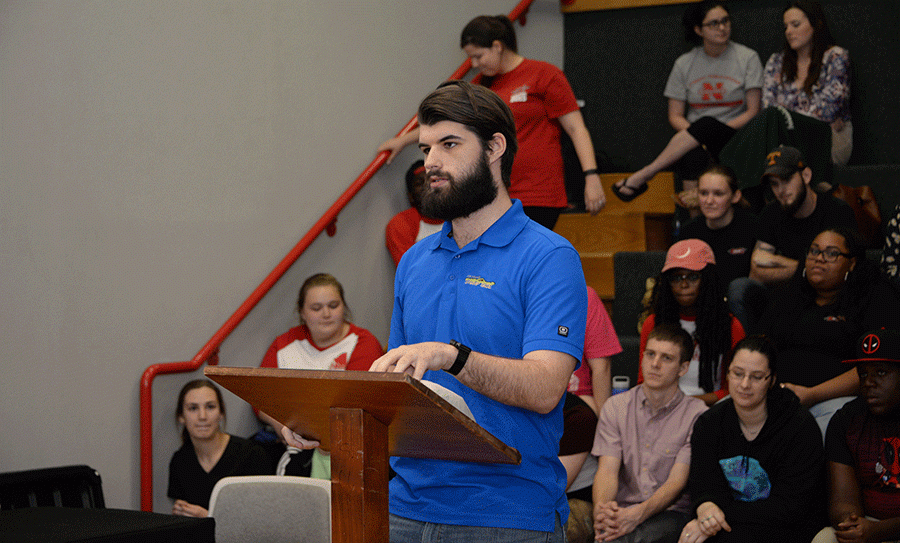Jacob Parra, microbiology major and program director at KNSU, expresses his concerns about the yearbook fee being cut.
Students and faculty respond to university’s decision to cut yearbook at SGA Senate meeting
March 10, 2017
More than 45 students and faculty packed Monday’s SGA Senate meeting to respond to the university’s decision to cut the yearbook — a decision that many felt was made without adequate input from students.
“They made this decision without the student body’s opinion, without their option to even voice their opinion,” said Chelsea Jackson, a mass communication major. “I know people want to look back twenty years from now and see the picture of their friends, their past, their experience here at Nicholls.”
Jackson said if the administration chose to do this to the yearbook, what’s next?
News of Nicholls administration’s decision to discontinue the yearbook and replace the yearbook fee with two new fees for other programs came when the school made the formal request to the University of Louisiana System Board of Supervisors February 23. The request was approved eliminating the $10 yearbook fee and creating two $5 fees funding the Student Success and QEP programs.
The administration’s decision was based on three committee meetings held in July, said Alex Arceneaux, chief of staff. The meetings included campus leaders, student government leaders, staff leaders, unclassified and classified leadership, faculty president and administration.
Student Government Association Vice President Austin Wendt, along with SGA President Tommy Thibodeaux, said he attended the meetings but that he thought the meetings were gathering information, not making an official decision
During Monday’s meeting, students also voiced concerns about the decision-making process to cut the yearbook.
“I wanted to know what was discussed in those meetings, which organizations were being evaluated and which organizations on campus were going to be taken out without our input,” Ana Pizzolio, a mass communication major and senior news editor for the Nicholls Worth, said. “We wanted to know what was going on and we were shut down.”
But most students, like Jacob Parra, a microbiology major and program director at KNSU, said they don’t want to lose a publication of memories.
“I pick up the yearbook every year, not because I want it every year, but because in twenty or thirty years, my kids, if I have any, will be able to look at it and say ‘Wow dad, why was your hair so long? Why didn’t you shave your beard?’” Parra said.
Previously, Lynn Gillette, Nicholls provost and vice president for academic affairs, said it was an issue of currency.
“Technology has so changed that the idea of a yearbook needs to be re-thought,” Gillette said. “There are many, many, most, universities in the United States that have done away with a yearbook. So, it doesn’t mean that we don’t think people should have pictures and all that kind of stuff, the question is, is a yearbook the best collector of that in the modern technological stage?”
But Hollyn Millet, an education major and current yearbook editor, said at the meeting that an online yearbook and social media are different.
“That’s not forever,” Millet said. “You can’t look back at one of your best friends when you graduated or if someone might have passed away. You won’t have that anymore so it’s very important to keep the yearbook here because it means so much in later years.”
Others voiced concern about the administration’s decision to move the yearbook’s roughly $500,000 account to the university’s general fund.
James Stewart, mass communications department head, said the money in the yearbook account could be used in a lot of different ways, like bringing all media together in a convergence media center, that would be in the spirit of the fee when students paid it.
“We have a television station and radio station, a newspaper and a yearbook,” Stewart said. “We’ve been trying to get those things working together because obviously, the yearbook fund is extremely healthy to the tune of about $500,000 and we have argued that we can produce better content for you and save a lot of money.”
Stewart and Nicki Boudreaux, instructor of mass communication and director of student publications, sent a formal proposal to be considered by the Space Utilization Committee in fall 2015 and there have been discussions with the administration since then, but nothing has been done.
Ultimately, SGA Vice President Wendt said he has the authority to create an ad-hoc committee, comprised of students involved in student publications and members of the SGA, to address the yearbook’s future.
“Going forward, we’re going to try and resolve this issue and take this up as a student government matter,” Wendt said. “But we as the Student Government Association keep the administration accountable to the students.”
